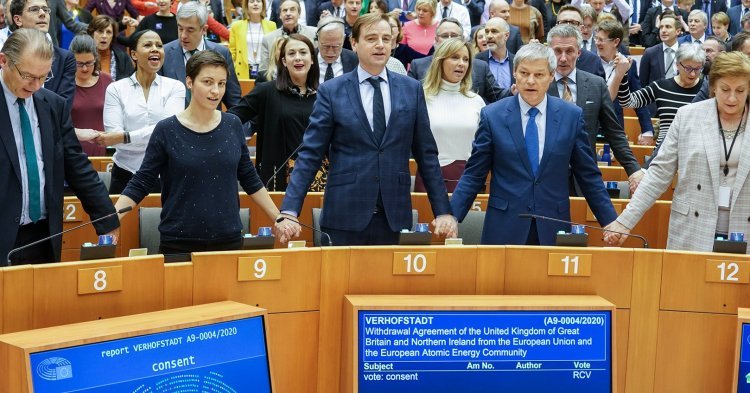Could you start by telling us about your position within the European Federalist Movement and its role?
I have been the President of the Italian European Movement since 2010, where organisations such as the Federalist Movement or the Young Federalists, came together. The European Movement was established to implement and fulfil the aims laid out by the Ventotene Manifesto, including the establishment of a federal Europe. In order for this to be at all possible, there needs to arise a constituent and democratic movement, which gives the European Parliament the role of preparing, approving, and presenting to national parliaments an EU constitution. Ideally, we are aiming for this project to be approved within this parliamentary term [2019-2024]. As president of the European Movement, I work within this framework, urging parties and civil authorities to support this goal.
You are one of the founding members of the Crocodile Club, launched 40 years ago, could you tell us what led you to join this group?
I began working with Altiero Spinelli as his personal assistant in the Italian and European Parliaments in 1977. Previously, I had been a researcher at the Institution of International Affairs, which was also founded by Spinelli. So, in 1977 I started my journey with Spinelli, which led to his election as an MEP in 1979. He brought with him a new agenda based on the idea of reforming the European Community by granting the European Parliament a constituent role.
The first step we took was rejecting the European budget in December 1979, as we considered it to be inadequate in terms of accomplishing the Community’s objectives at the time. This debate further demonstrated how the Treaties were inadequate for carrying out common policies that responded to citizens’ needs. Spinelli took on this battle, adopting the Socratic mode of inquiry), in order to demonstrated that the Treaties required change. Following this crisis’ outcome, with the Council presenting to Parliament a budget which was even worse than the one it had previously rejected, Spinelli took the opportunity to inform MEPs that they must personally take on the responsibility of encouraging reform.
The Crocodile Club was established on 9 July 1980, where only nine MEPs initially took part. As time went on, however, more members joined. It was here, for example, that the idea was born to set up an Institutional Affairs Committee, which eventually drew up the draft treaty which was then approved by the European Parliament on 14 February 1984.
Returning to the present day, we find ourselves in a situation which in some ways resonates with that we found ourselves in 40 years ago - particularly, in terms of the difficulty that European institutions face when dealing with national institutions. In your opinion, which way do you think we should be heading? What reforms must be introduced on a European level to overcome this impasse?
For now, the European Parliament must reject the compromise on the 2021-2027 Multiannual Budget which is being prepared by the Council, as it is simply inadequate. Parliament has the power, as it did in 1979, to reject the Council’s proposal. This means that by the end of the year, if the compromise is to be the one proposed by Charles Michel, President of the European Council, it must be rejected.
This will inevitably cause a conflict with the Council, and Parliament will have to emphasize the fact that there are many gaps in the Treaty which need addressing. For example, Parliament has no power in defining revenues and only has the power to vote with the Council on expenditure. Secondly, said revenues must be voted on unanimously by the Council and then ratified by national parliaments, thus granting individual states within the EU the right to veto. Thirdly, the EU lacks the authority to help the Union acquire new competences – for example, authority regarding health, immigration, or other factors in the social sphere.
The European Parliament should raise these issues regarding insufficient budgeting and inadequate levels of authority. The first phase of this battle is rejecting the budget proposed by the Council. Then, just as in 1979, it must begin a constituent process, in which the European Parliament must play an active role.
Many European citizens don’t feel represented by European institutions themselves.There appears to be a difference between the perceptions of the national political life and the European one. What are your thoughts on the matter? What could possibly be done to change this perception?
Results from opinion polls show that European citizens feel even less represented by national institutions than they do by European ones. The level of citizens’ confidence in their national parliaments is much lower than it is in European institutions. A common criticism that citizens make of Europe is that the EU itself does not have sufficient powers to resolve their issues. Therefore, the way forward would be providing the EU greater powers and authority so that it may undertake initiatives that individual nations alone are unable to carry out. The only way to overcome this inadequacy would be by granting the EU authority in situations where member states are not able to act.
Citizens will only feel better represented by the European Union once a real government is in place and once European elections are carried out in order to elect the Government of Europe. European citizens feel that their vote in EU elections is not a sufficient way of making their voices heard. The only way to change this view would be by ensuring the Unions had the powers to act more effectively. This could only be achieved by reforming institutions, granting greater powers to Parliament, and doing so in such a way that a government, elected by the parliament itself, would be working with Parliament, as so happens in all our parliamentary democracies.
Ww have witnessed the emergence of national governments that appear to be preventing the possibility of increasing EU powers and authority in recent years. Two examples are Poland and Hungary, governed by anti-European parties; or Italy itself, where such parties are gaining increasing support. Do you believe that this could mean a step backwards, questioning the successes of the EU in the recent decades, or is it instead an obstacle that must be overcome in order to restore the path to European integration?
In the European Parliament, ‘nationalist’ parties, so to speak, are a minority, representing between 20-25% [1]. Even though these groups refer to political cultures that exist in all member states, if we convened a conference with all national and European parliamentarians (as took place in Rome in 1990), we would realise that this sphere of anti-European forces constitutes a minority. For this reason, we believe it is necessary for the European Parliament to invite national parliaments to a European Debate. If such a meeting took place, a pro-European majority would undoubtedly emerge.
Naturally, any draft constitution drawn up by the European Parliament should be subject to ratification by all Member States. If a country were to consider participating in this process unfavourable to its own interests, a system would be put in place that would allow the majority of countries to move forward, despite there being some reluctant countries. In the words of the Spinelli Draft of 1984: ‘the leap towards the federation must be made between those who are there’. We then have to see if the Polish or Czech or Hungarian governments would really decide to take part or not, as these countries derive numerous advantages from their EU membership. Nevertheless, there is a need to produce a concrete project for the political advancement of the Union, so that citizens may decide for themselves.
In fact, our idea is that ratification should take place through an EU-wide referendum, so that citizens themselves may voice their opinions. Recent events show that a pro-European trend exists, both in local and municipal elections, and even in the latest Polish election, where the mere fact that the pro-European candidate went head-to-head against President Duda already suggests that there is a strong sector within the Polish civil society which wants more from the EU.


Follow the comments: |
|
